Two projects were awarded in April 2020
(pending institutional, regulatory, and NIH approvals):
PI: Paul Mathew, MD, Tufts Medical Center
Co-Investigators: Debra Poutsiaka, MD, Tufts Medical Center; Andreas Klein, MD, Tufts Medical Center; Amandeep Godara, MD, Tufts Medical Center; Hilal Hachem, MD, Tufts Medical Center
Title: A Phase 2 Trial of Infliximab in Coronavirus Disease 2019 (COVID-19)
Grant Type: T1
Abstract:
Background: Fifty percent of admitted patients with COVID-19 require intensive care monitoring for
cardiorespiratory support. With intubation, the mortality rate approaches 85%. Death from cardiorespiratory failure is principally triggered by a lethal cytokine storm. Diverse lines of evidence implicate TNFα derived from virus-activated macrophages as an early driver of the cytokine storm, regulating fever and rising ferritin levels, upstream of IL-6 and other inflammatory cytokines, and orchestrating dysregulated cytotoxic T-cell and NK viral immunosurveillance. Studies of TNFtargeting in COVID-19 are justified and urgently required.
Hypothesis: Early institution of TNFα inhibitor therapy in patients with severe COVID-19 infections will reduce the need for advanced cardiorespiratory support and early mortality.
Aims: (1) Assess the clinical activity of infliximab therapy in severe COVID-19 (2) Correlate basal
and dynamic changes in cytokine levels post-infliximab with clinical outcomes.
Methods: Key eligibility: Patients with COVID-19 pneumonia and severe hypoxemia ineligible for COVID-19 Treatment Team priorities, exclusive of active tuberculosis or fungal infection. Patients receive a single dose infliximab 5mg/kg intravenously, repeated in 14 days at physician discretion. The first stage of a Simon 2-stage design will be studied to generate critical preliminary data. If >6/17 patients respond, a second stage is justified with additional support (n=20), targeting a 50% response rate (power 0.9, =0.05). Principal Endpoint: Increase in SpO2/FiO2 of >50 compared to baseline within 72 hours of drug administration, sustained for a minimum of 48 hours. Secondary endpoints include incidence/duration of advanced cardiorespiratory support, 28 day-mortality and comparison
of cytokine profiles between responders and non-responders.
PI: Tania Konry, PhD, Northeastern University
Title: PCR Free RAPID Testing for COVID-19 with One Step Assay for Colorimetric Viral RNA Detection
Grant Type: T.5; T1
Abstract:
Currently, COVID-19 has spread out to all countries over the globe. Since no treatment or vaccination currently exists, the ideal strategy being pursued by the world governments is to rapidly identify and isolate positive cases. However, several challenges exist due to i) the overwhelming speed at which the virus spread is occurring and ii) the confounding mild symptoms that affect the largest part of the subjects, easily mistaken for seasonal flu. An improvement in the diagnostic testing is therefore paramount to achieve superior control over this and future pandemics. During uncontrolled pandemic, the testing demand increases faster than the supply and the investigation of novel methods is critical to overcome technical limitations such as testing throughput, speed, operational complexities and lack of Point-of-care Testing (POCT) approaches. We propose herein to develop a novel viral detection principle that can quickly detect low levels of viral-RNA by colorimetric signal using isothermal (room temperature) amplification coupled in a POCT- oriented device. This concept will be implemented by detection of multiple target detection probes (e.g. seasonal influenza strains vs. SARS-CoV-2 strain) to enable accurate and multiplexed detection, allowing several diagnoses in one test. The testing protocol will be incorporated in a compact lab-on-a-chip system for achieving reduced sizes, ease of use, high-throughput and potential for POCT. Therefore, this approach will be ultrasensitive, able to detect single viral molecules from patient samples, while retaining the high-throughput, quantitative and automation capabilities necessary for large-scale testing.



